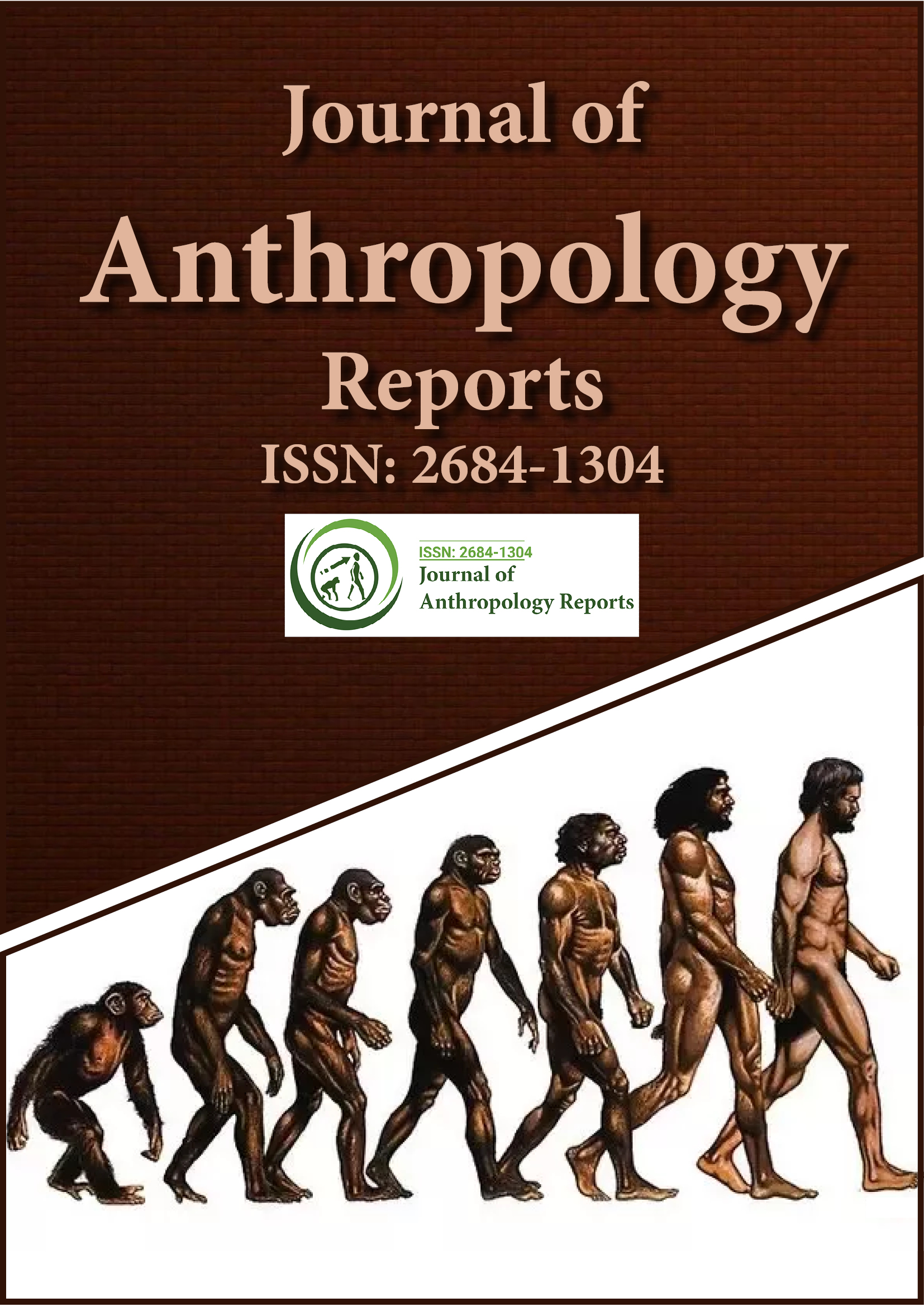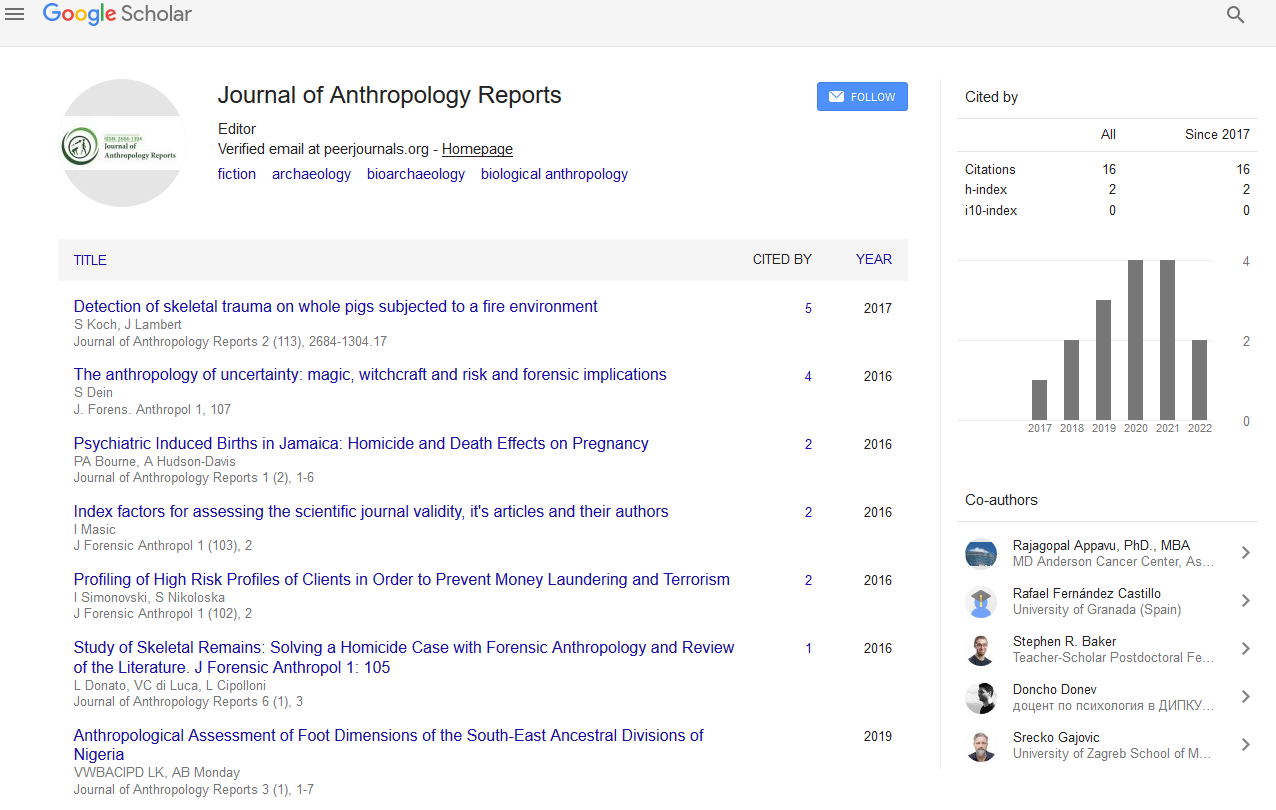Indexed In
- RefSeek
- Hamdard University
- EBSCO A-Z
Useful Links
Share This Page
Journal Flyer

Open Access Journals
- Agri and Aquaculture
- Biochemistry
- Bioinformatics & Systems Biology
- Business & Management
- Chemistry
- Clinical Sciences
- Engineering
- Food & Nutrition
- General Science
- Genetics & Molecular Biology
- Immunology & Microbiology
- Medical Sciences
- Neuroscience & Psychology
- Nursing & Health Care
- Pharmaceutical Sciences
Perspective - (2023) Volume 6, Issue 4
Anthropological Theories: Tracing their Evolution and Impact on Cultures and Societies
Namiki Nakamura*Received: 20-Nov-2023, Manuscript No. JFA-23-23410; Editor assigned: 22-Nov-2023, Pre QC No. JFA-23-23410 (PQ); Reviewed: 06-Dec-2023, QC No. JFA-23-23410 (QC); Revised: 13-Dec-2023, Manuscript No. JFA-23-23410 (R); Published: 20-Dec-2023, DOI: 10.35248/2684-1304.23.6.173
Description
Anthropological theory serves as the foundation of the discipline, providing a framework for understanding the complexities of human societies, cultures, and behaviors. In this article, we will delve into the world of anthropological theory, its evolution, key concepts, and its enduring significance in understanding the difficulties of human existence.
The birth and growth of anthropological theory
Anthropological theory has evolved significantly over time, shaped by the work of pioneering scholars and changing societal contexts. The discipline itself emerged in the 19 th century as explorers and scholars sought to understand the diverse cultures encountered during colonial expeditions. The earliest anthropologists, like Lewis Henry Morgan and Sir Edward Tylor, laid the foundation for anthropological theory by proposing ideas about the evolution of human societies and the universality of certain cultural traits.
Key concepts in anthropological theory
Cultural evolution: Early anthropological theories often centered on the concept of cultural evolution, which posited that societies progressed through stages of development, from savagery to civilization. This linear view has been largely abandoned in contemporary anthropology but contributed to the discipline's growth.
Cultural relativism: As anthropology matured, cultural relativism emerged as a fundamental principle. This concept advocates for understanding and evaluating cultures within their own context, without imposing external judgments. It emphasizes the importance of respecting and valuing cultural diversity.
Functionalism: Functionalism, associated with figures like Bronislaw Malinowski and A.R. Radcliffe-Brown, examines how cultural institutions and practices contribute to the stability and function of a society. It seeks to understand how different aspects of culture work together to meet the needs of individuals and communities.
Structuralism: Developed by Claude Lévi-Strauss, structuralism explores the underlying structures and patterns of thought that shape human culture. It suggests that universal mental structures underlie cultural expressions, allowing for cross-cultural analysis.
Symbolic anthropology: Symbolic anthropology, led by Clifford Geertz, focuses on the interpretation of symbols and meanings within a culture. It emphasizes the role of symbols, rituals, and narratives in understanding human behavior and society.
The relevance of anthropological theory
Anthropological theory continues to be relevant in contemporary society for several reasons:
Cultural understanding: In our increasingly diverse and interconnected world, anthropological theory helps us understand and appreciate the rich tapestry of human cultures. It provides tools for navigating cultural differences and fostering cross-cultural communication and collaboration.
Critical analysis: Anthropological theory allows us to critically analyze societal issues such as racism, inequality, and cultural appropriation. It provides a framework for examining how power dynamics and cultural norms shape human experiences.
Applied anthropology: Anthropological theory is essential in applied fields such as medical anthropology, development anthropology, and urban anthropology. It helps address real- world problems by applying anthropological insights to issues like healthcare, poverty, and community development.
Anthropological theory serves as a vital intellectual framework for understanding the diversity and complexity of human societies and cultures. It has evolved over time, incorporating new perspectives and methodologies, and remains relevant in addressing contemporary global challenges. By embracing concepts like cultural relativism and functionalism, anthropological theory allows us to navigate the intricacies of human existence and contribute to a more inclusive and culturally sensitive world. It continues to resolve the threads of the human understanding, helping us appreciate the beauty and complexity of our shared human experience.
Citation: Nakamura N (2023) Anthropological Theories: Tracing their Evolution and Impact on Cultures and Societies. J Anthropol Rep. 6:173.
Copyright: © 2023 Nakamura N. This is an open-access article distributed under the terms of the Creative Commons Attribution License, which permits unrestricted use, distribution, and reproduction in any medium, provided the original author and source are credited.

